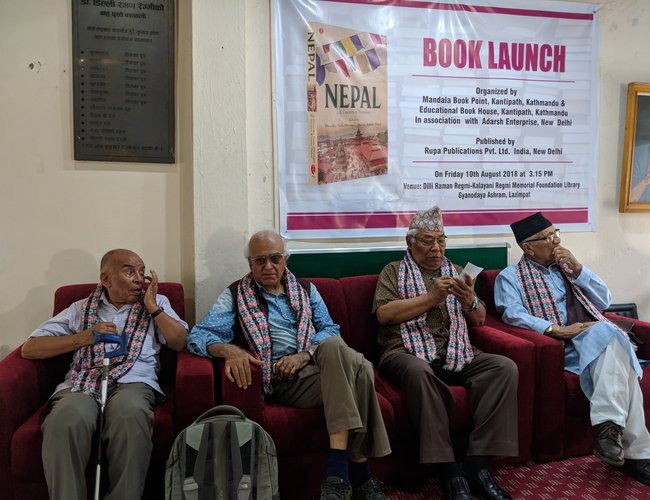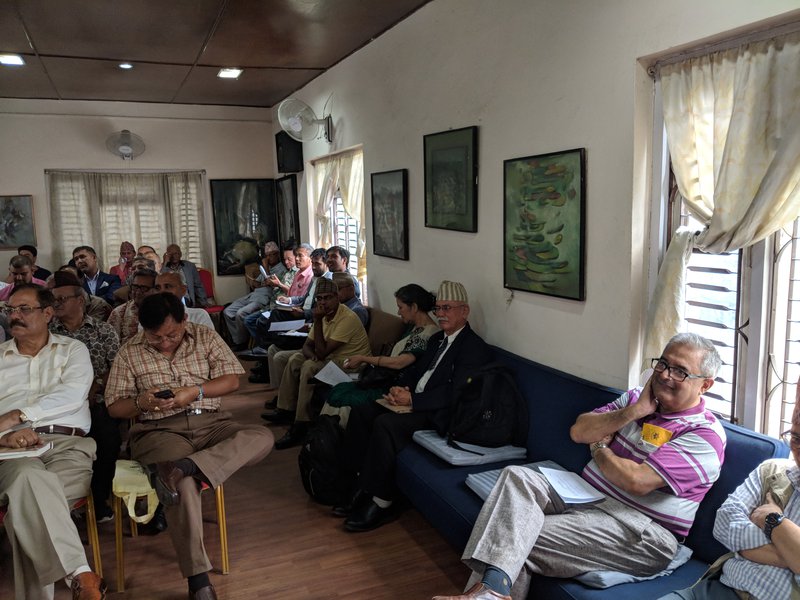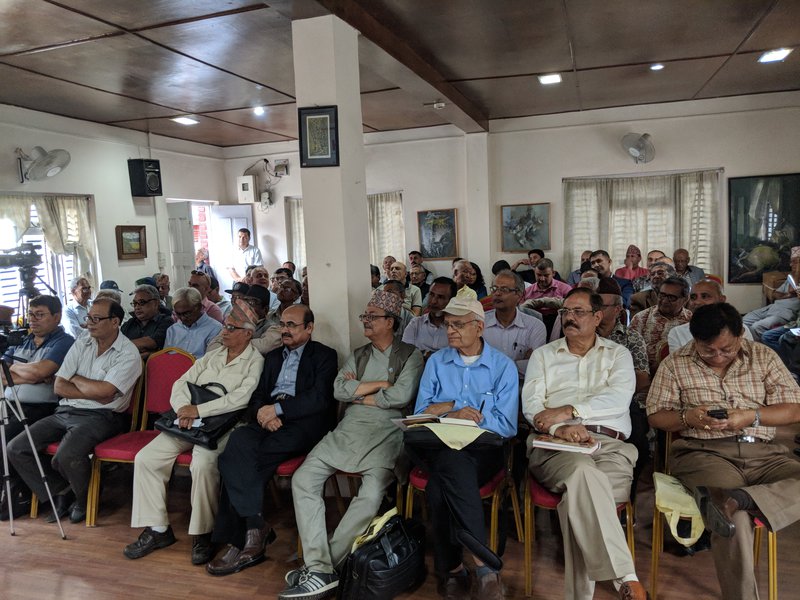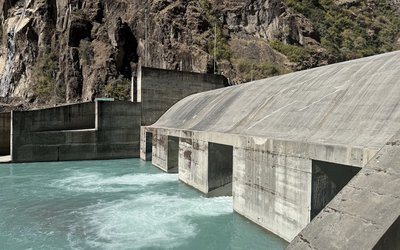
It's most welcome that Nepalese intellectuals are coming forth with their insights, analysis and wisdom of history and the state of the Nepal State. Hopefully, more will come forth to enlighten us with their experiences and challenges. This is the best way to develop endogenous approaches to a public policy curriculum and its teaching. I ask myself whether the title is appropriate. Is Nepal in 2018 still under transition?
I am honored and grateful to place my view on " Nepal: A country in transition" and I would like to thank Dipak Gyawaliji and Dr Dwarika Dhungelji for inviting me to do so today.
Let me start with their article 'Corruption the Bane of Nepali Governance' (Chapter 9) because I believe that it is, at the core, corruption which has brought to an end all past regimes and the political fortunes of all political parties as citizens vote them out of power and throw up new political leadership .
The authors say "the country may have strong legal and institutional frameworks, but the image of the country has been growing from bad to worse from all indications " (P 301). This is putting it tamely for as lessons from Romania, Ukraine, Malaysia and now Pakistan suggest that ensuing radical politic movements in quest of pro poor prosperity and justice will result in imprisonment of political and economic elites whose nexus gives rise to crony capitalism in a mafia-driven economy and society where political parties will enter into gang fights, desertions and patronage from powerful neighbors in the protection of self interest at the cost of national interest where public posts are awarded to the highest bidder. As anarchy grows in society, democracy will be weakened as citizens’ clamor for a strong, clean man to lead the nation and ensure justice.
Nepal : A country in transition Reviewed of the Book
What disappointed me in this learned, empirical study is the complete absence of the role of foreign aid and INGOs in feeding corruption in our society. Let's be clear: 11 years of remittance income (1996-2004) had greater impact on reducing poverty than more than 50 years of foreign aid! Aid as a source of corruption began when aid agents would resort to sharing their commissions with politicians and top bureaucrats and began the practice of lodging their commissions in offshore banks. The authors do mention the case of the German aided Marsyangdi project which was a case of ' aid in reverse' by implementing a project that was 5 times higher than the actual market price with a historic 50 months delay! Here was a virtual milking cow for the Germans, aid agents, contractors, bureaucrats and NEA managers! No income taxes whatsoever are paid on the commissions by the agents. Their status as legitimate agents are not even mentioned in the contracts signed. They remain hidden. It is well documented that has high as 70-80 % of all aid flows back to the donor country and no more than 10% to the beneficiaries with rest being pocketed by politicians and bureaucrats. The irony is that to receive aid we need to fund such projects with 20% of the project presumably to meet local operational costs!
Editor Madan Dahal 's 'The Unremitting Struggle For Economic Survival and Growth" ( Chapter 4) left me wondering whether the united voice of 'prosperous Nepal' following the successful passage of the Constitution 2072/2015 a stable Communist government with a two third majority in Parliament and also 6/7 Provinces would become a reality. Specifically, Nepal has committed to leave the ranks of the LDC nations by 2022 and to become a middle income country by 2030: which would require its GDP growth of around 8% -9% per annum. Prof Dahal rightly says that this remains a daunting task given its inability to spend its capital budget which alone helps capital formation without which growth is not possible. This requires modern infrastructure; good governance seeking transparency and accountability of all political and bureaucratic executives; effectiveness in decision taking at the policy level by the central and the 750 local governments; efficiency in the use and allocation of resources through recourse to a national and local market economy where all monopolistic behavior is strictly controlled and, not least, a war on corruption with a sound criminal justice system in place.

Most of the basics are not in place yet -- except the intended creation of sound infrastructure which if not fully utilized can create massive debt problems leading to economic instability that will cause political instability despite the parliamentary and provincial majorities.
I congratulate Dr Madan Dahal for his vision to build a strong national economy. However, he fails to tackle the issue of our 'currency union' with India which means we can hardly build a strong national economy as the foreign exchange regime compromises the need for an independent interest and inflation policies and export and import diversification to reduce economic dependency on India.
Rabi Raj Thapa and Chiran Jung Thapa's " National Security: Challenges and Perspectives" (Chapter 7) article was an eye opener for me. They underscore the existential threats to Nepal coming from the external environment and myriads of external forces. Amidst the internal threats they underscore the factor and force arising from criminalization of politics and polarization of crime, which is how a mafia economy gets born in the virtual absence of a sound criminal justice system. When 6/13 IGPs have been indicted of corruption the so-called mafization of the economy and society is well under way. The matter is compounded by the fact 4/7 of the IGPs of the Armed Police Force, founded only in 2000, have also been indicted for corruption. Add to this sorry security scenario, the link between politicians and party protected criminals outfits. In October 2008 Maoist - led government withdrew 349 criminal cases whereas the UML led government in 2009 withdrew 282 criminal cases. In fact, many politicians sitting in Parliament have criminal records, including engaging in human trafficking.
The other eye opener from Chapter 7 is that the constitutionally provided National Security Agency is a misnomer -- being more a National Defense Council comprising the Nepal Army represented by the Chief of Staff as members along with the PM and home, defense, finance and Chief Secretary. Its Secretariat is manned by ' reluctant' officers nominated by the security agencies. What's pitiful is that the NSC has no national security policy to guide them! Made worse by political parties not agreed on what Nepal's core national interests are? It is clear from this Chapter that Nepal's grave weakness is for its leaders to have the capacity for strategic thinking. It is no wonder that we lack the ability to think long term and to execute and coordinate plans.
The authors do no tackle the likely impact on our national security from climate change and global warming. Had they done so issues arise whether comprehensive security or human security should be included in the nature and scope of the National Security Council; with all the ramifications as to it composition and membership over the role of civil society, Think Tanks and Independent intellectuals .

The authors somehow ignore whether and to what extent the Nepal Army should be undertaking infrastructure projects without compromising its national security duties. They also have ignored the pertinent question of just how many security agencies does Nepal need and what is the optimal size of the security forces? Especially, given the fact that close to a battalion may be serving as household staff of current and retired personnel.
Foreign policy experts Prof Mohan Lohani and Dr. Nischal Pandey’s " Foreign Policy: Challenges and Opportunities " (Chapter 6) comprehensively treat the subject in their contribution sticking true to their assertion that both history and geography are determinants of foreign policy. One is struck immediately by any reference to King Birendra's Zone of Peace concept, which was the cornerstone of our foreign policy from 1974-2001. 114 countries had endorsed the policy, except India because it rejected the commitment to ' special relations' It was reinforced by the Birendra's admirable initiative to strategize foreign policy with national security and national interest clearly defined -- fir the first time ever history of foreign policy making This was the glory days of Nepal in international relations and diplomacy with Nepal taking a lead of the LLDC group, effective participation and due recognition by the UN Security Council for its role in UN Peacekeeping, international appreciation of its voting behavior in the UN system as a truly non aligned nation, state visits by several European leaders and, not least, moving the SAARC process and founding SAARC.
The authors call for the review of the UK-India-Nepal Tripartite Agreement as it smacks of Nepal supplying mercenaries to the treaty Partners. No alternatives are suggested. Significantly, the Communists and Maoists who were in the forefront opposing this treaty have now agreed to allow UK to recruit women Gurkhas!
In the concluding session, the authors quote me at some length on the strategic direction of our foreign policy in the 21st century’s multi polar and turbulent times. Let me briefly underscore here what our foreign policy goals should be. They should be nonalignment and neutrality with comprehensive strategic partnerships with Bangladesh, China and India along with active partnership in the UN offering to go beyond UN Peace keeping to UN Peace enforcement: With calling for all countries recruiting Nepalese nations to be given citizenship on recruitment.
Last but not the least, this book should find a place in all Universities and colleges and, as I said at the start, can lay the foundation for starting Public Policy degree courses.

Prof. Madhukar SJB Rana
Executive Director, SAIM Leadership & Executive Development Center and Former Finance Minister . He can be reached at madhukarsjbrana@gmail.com
- People Public Private Partnerships
- Nov 29, 2018
- An Alternative Meaning Of Inclusion And How Nepal Should Strategize
- Nov 20, 2018
- The Fundamental Reality Of Our Currency Union With India With Its Pros And Cons
- Jun 12, 2018
- A Macroeconomic Assessment Of The 2018/19 Budget
- May 30, 2018
- An alternative Meaning Of Inclusion And How Nepal Should Strategize Development 2018-2025
- Apr 06, 2018















